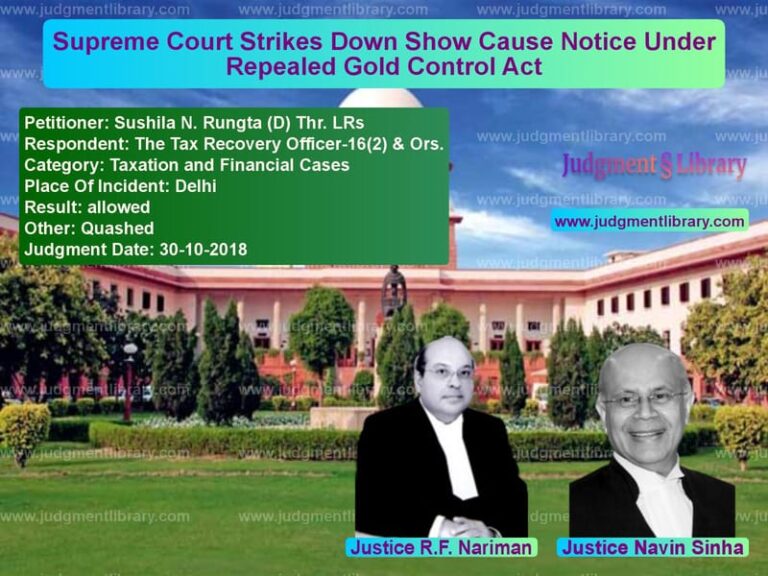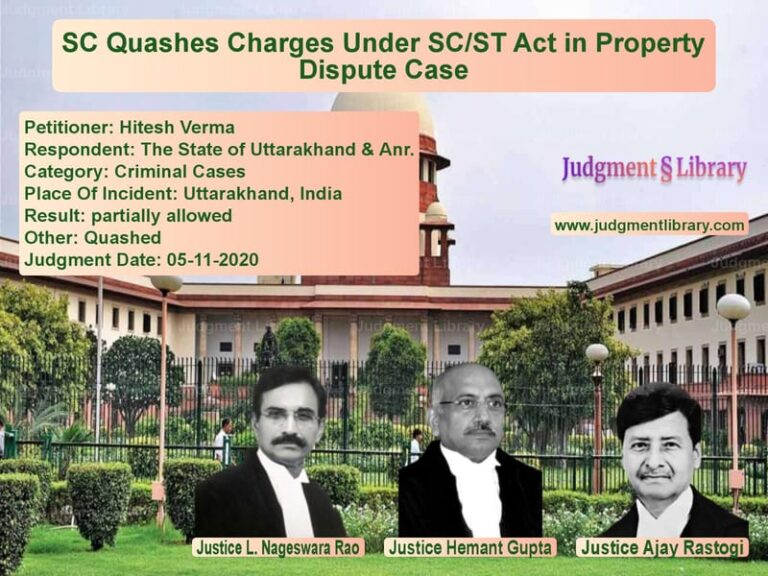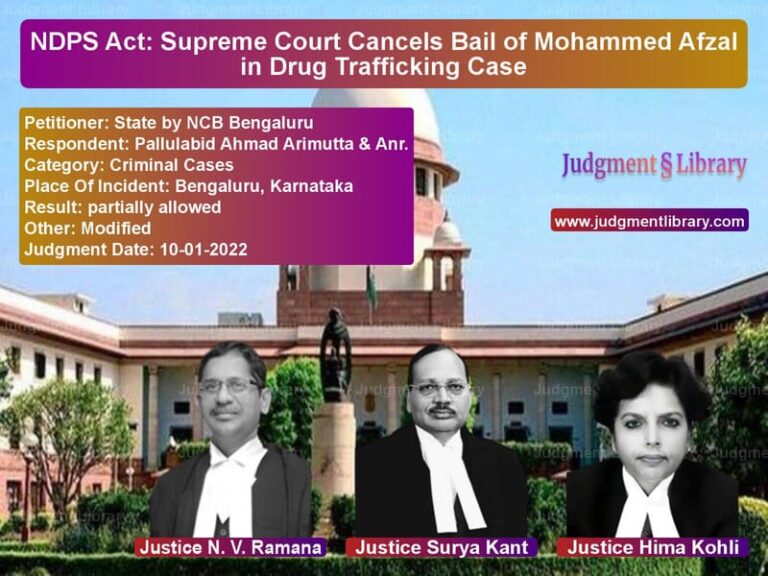State of U.P. vs. Vinay Kumar Singh: Supreme Court Remands Mining Lease Dispute Case
The Supreme Court recently ruled in the case of State of Uttar Pradesh & Others vs. Vinay Kumar Singh, involving a mining lease dispute between the petitioner, Vinay Kumar Singh, and the State of Uttar Pradesh (U.P.). The Court addressed the issue of the respondent’s claim for a refund of amounts paid for a mining lease due to a boundary dispute between the states of Uttar Pradesh and Madhya Pradesh. The Supreme Court’s decision overturned the High Court’s ruling, and the case was remanded for fresh adjudication.
Background of the Case
The respondent, Vinay Kumar Singh, had been granted a mining lease by the State of U.P. to excavate sand and morum from a 25-hectare area in the Bilharka village, located within the territorial limits of U.P. The lease was valid for five years, from February 13, 2019, to February 12, 2024, with the royalty payable for the first year amounting to ₹26,35,00,000, with annual increments of 10% thereafter.
However, when Singh commenced mining operations, the district administration of Chhatarpur, Madhya Pradesh, raised an objection, claiming that a portion of the leased mining area (300 meters) fell within the territory of Madhya Pradesh. Despite attempts by the U.P. administration to resolve the issue, the boundary dispute remained unresolved.
Subsequently, Singh approached the High Court of U.P. by filing a writ petition, seeking directions to the governments of U.P. and Madhya Pradesh to resolve the boundary dispute. He also requested that the amount already paid as royalty for the mining rights be refunded if the dispute remained unresolved.
Legal Proceedings
- 2019: Singh files Writ C No. 18794 of 2019, seeking resolution of the boundary dispute.
- 2019: High Court disposed of the petition, directing the State of U.P. to resolve the boundary issue and prevent any coercive action for royalty recovery until the issue was settled.
- 2022: Singh files Writ C No. 37749 of 2019 seeking a refund of ₹26,65,66,666 for the inability to mine the area due to the unresolved boundary dispute.
- 2023: The High Court ruled in favor of Singh, ordering the State of U.P. to refund the money paid by Singh, along with interest, for the undelivered mining area.
- August 2023: The Supreme Court intervenes, hearing appeals by the State of U.P., and remands the matter to the High Court for fresh adjudication, setting aside the previous orders.
Arguments by the Petitioner (Vinay Kumar Singh)
The appellant’s counsel, Ms. Garima Prashad, presented the following arguments:
- Boundary Dispute with Madhya Pradesh: Singh argued that the boundary dispute had hindered the mining operations, as a portion of the area in the mining lease was located in Madhya Pradesh.
- Failure to Resolve the Dispute: Despite several attempts, the State of U.P. failed to resolve the boundary issue, which affected Singh’s ability to execute the mining lease agreement.
- Frustration of Contract: Singh argued that the contract was frustrated due to the State of U.P.’s inability to provide possession of the mining area. This rendered the mining lease agreement void and entitled Singh to a refund of the amounts already paid.
- Injustice in High Court’s Ruling: Singh contended that the High Court’s decision to dismiss the appeal without considering the facts of the boundary dispute was unjustified.
Arguments by the Respondents (State of U.P.)
The respondents, represented by Ms. Meenakshi Arora, made the following arguments:
- Possession of the Mining Area: The State of U.P. contended that it had provided the mining area as per the agreement, and the issue of boundary encroachment was a problem solely between Singh and the State of Madhya Pradesh.
- State’s Efforts to Resolve Dispute: The respondents stated that the State of U.P. had made multiple efforts to resolve the boundary dispute, including writing letters and organizing joint inspections with officials from Madhya Pradesh.
- Misleading Petition: The respondents pointed out that Singh’s writ petition failed to provide accurate details about the boundary dispute and did not justify his claim for a refund.
- Royalty Payment: The respondents argued that Singh had already paid the first installment of the royalty and had started mining operations in the area allotted to him, which further complicated the refund request.
Key Observations by the Supreme Court
The Supreme Court made several important observations during the course of its judgment:
1. High Court’s Overlooked Issues
“The High Court has overlooked the crucial issue of whether possession of the disputed mining area was actually handed over to the petitioner. This issue is central to the determination of whether the petitioner is entitled to a refund.”
The Court noted that the High Court’s ruling failed to consider the factual background presented in the appellant’s petition regarding the boundary dispute.
2. State’s Failure to Address the Boundary Dispute
“The failure of both States to resolve the boundary issue in a timely manner has resulted in a situation where the petitioner has been unable to carry out the mining operations as per the lease agreement.”
The Court acknowledged that the delay in resolving the boundary dispute hindered Singh’s ability to utilize the mining lease.
3. Inconsistent Determination of Mining Area
“There is no clear determination of which portion of the leased mining area lies within the disputed territory of Madhya Pradesh. This needs to be addressed by the High Court to ensure fairness in the resolution of the dispute.”
The Court emphasized that a clear demarcation of the mining area was necessary before proceeding with the refund request.
4. Role of Contractual Obligations
“The contract between the parties was based on mutual agreement and the delivery of possession of the mining area. Since possession was never fully delivered, the issue of frustration of contract needs to be reconsidered.”
The Court highlighted that the State of U.P. must address the non-delivery of possession before the claim for a refund can be fully adjudicated.
Final Judgment
The Supreme Court ruled:
“The appeals are allowed. The impugned orders of the High Court dated 30.09.2022 and 12.05.2023 are set aside. The case is remanded to the High Court for fresh adjudication in light of the observations made by this Court.”
The Court further directed that the High Court consider all the issues related to possession, boundary dispute, and refund and adjudicate the matter expeditiously within three months.
Conclusion
The Supreme Court’s judgment in State of U.P. vs. Vinay Kumar Singh clarifies the legal implications of non-delivery of possession in mining lease agreements and the importance of resolving inter-state boundary disputes. The ruling also serves as a reminder of the need for transparency and timely action in government disputes. By remanding the matter to the High Court, the Court ensured that the claim for a refund is fully considered in light of the facts and legal principles involved.
Petitioner Name: Vinay Kumar Singh.Respondent Name: State of U.P. & Others.Judgment By: Justice Dhananjaya Y Chandrachud, Justice J B Pardiwala, Justice Manoj Misra.Place Of Incident: Banda, Uttar Pradesh.Judgment Date: 23-08-2023.
Don’t miss out on the full details! Download the complete judgment in PDF format below and gain valuable insights instantly!
Download Judgment: vinay-kumar-singh-vs-state-of-u.p.-&-othe-supreme-court-of-india-judgment-dated-23-08-2023.pdf
Directly Download Judgment: Directly download this Judgment
See all petitions in Contract Disputes
See all petitions in Landlord-Tenant Disputes
See all petitions in Damages and Compensation
See all petitions in Judgment by Dhananjaya Y Chandrachud
See all petitions in Judgment by J.B. Pardiwala
See all petitions in Judgment by Manoj Misra
See all petitions in Remanded
See all petitions in supreme court of India judgments August 2023
See all petitions in 2023 judgments
See all posts in Civil Cases Category
See all allowed petitions in Civil Cases Category
See all Dismissed petitions in Civil Cases Category
See all partially allowed petitions in Civil Cases Category







